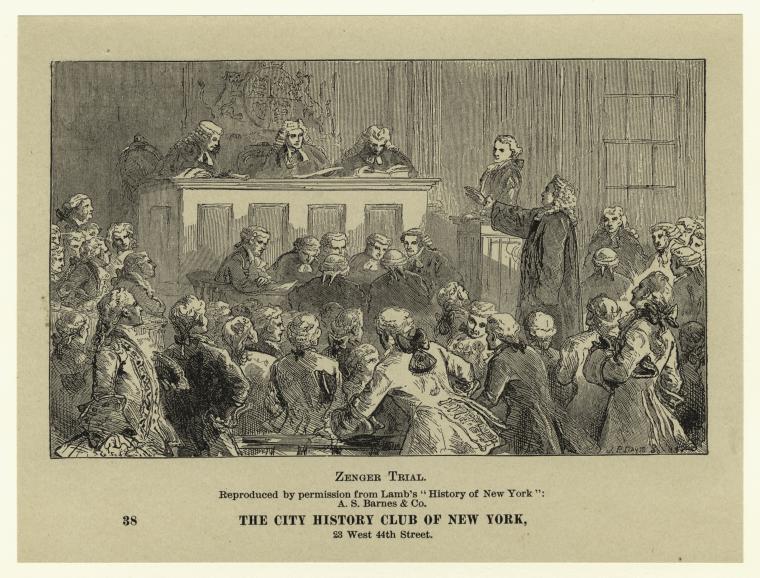In the media today, every public figure is being scrutinized through a magnifying glass. People are openly, and at times brutally, expressing their opinions about celebrities, athletes, and especially politicians. Now imagine if every reporter, journalist, or even just an ordinary citizen was arrested for publishing either images or written words that were deemed harmful to the reputation of a public figure. Today we have legal guarantees permitting us the freedom to speak freely about our opinions; it is called the first amendment to the Constitution, giving us the freedom of speech, press, religion, assembly, and petition. During the eighteenth century, however, this liberty was not yet established. Instead, this act was called libel, when an individual published untruthful or harmful opinions about government officials. John Peter Zenger spoke truth to power, and thereby he fought for the right of expression through written formation, particularly when the opinions and concerns of writers have a truthful undertone.
John Peter Zenger was born in 1697 in Impflingen, in the Palatinate land in Germany. In 1710, at the age of thirteen, John and his family immigrated to English America. They began their new lives in New York. When John turned fourteen, he began an apprenticeship with William Bradford, a royal printer in the New York colony. In 1719, upon the completion of his apprenticeship, Zenger moved to Maryland for a few years only to return to New York in 1725. The same year of his return to New York, Zenger became partners with his former mentor. The following year, John was able to establish his own printing business. His establishment was prospering by 1730. John’s company printed the first arithmetic textbook to be published throughout the colonies. Continuing his success, Zenger developed a newspaper in 1733 called the New York Weekly Journal.1

While Zenger was building and flourishing a successful business, New York was experiencing some political confrontations. The king of England had recently appointed William Cosby to be the new governor of New York. Cosby was a vicious leader who constantly abused his position for personal gain. He cared more about wealth than prospering the colony. Cosby sued the former acting governor, Rip Van Dam, for refusing to give him half of his salary, which he obtained while he was in office. When the case was sent to the provincial Supreme Court, chief justice Lewis Morris ruled against Cosby. In a spiteful act of retaliation, Cosby then went on to fire Morris. Afterwards, Morris and many other anti-Cosby supporters desperately wanted to reveal Cosby’s true nature to the colony. He was able to form allies with attorneys James Alexander, William Smith, Sr., and other influential political figures within New York, to establish a strong foundation of protesters to rally against Cosby and the following he was able to obtain within the administration. In order to obtain a stronger following and reach the general public, Morris and his fellow anti-Cosby supporters came up with the idea to reach the members of the colony through the printed press. However, no one would dare publish anything without the approval of local executives in fear of being accused of seditious libel.2 This is how Zenger became injected into the situation. Morris, along with the influence of his supporters, convinced Zenger to use his newspaper in an ongoing attempt to expose Cosby’s true character. Zenger willingly joined the cause. He allowed Morris and his following to write anonymous articles regarding Cosby and the need for liberty. James Alexander was responsible for editing all of the articles, and then Zenger would publish them into his newspaper. Zenger’s first issue of his newspaper was published on November 5, 1733.3 The articles from the paper aggressively attacked Cosby for his actions regarding the Van Dam incident. They scorned his political decisions, questioned all of his judgments, claiming them to be rash and irresponsible, and overall denounced his character. Despite the main focus of the paper focusing on removing Cosby as their governor, they also promoted the rights and liberties of what they believed belonged to a “true Englishmen.”4
- Funk & Wagnalls New World Encyclopedia, 2016, s.v. “Zenger, John Peter,” 1. ↵
- American National Biography (from Oxford University Press), 2010, s.v. “William Cosby,” by Robert E. Cray ↵
- John Thomas Lee, “The First Edition of the Zenger Trial, 1736,” Wisconsin Historical Society (September 1917): 4. ↵
- American National Biography (from Oxford University Press), 2010, s.v. “William Cosby,” by Robert E. Cray. ↵



18 comments
Vianey Centeno
Your opening paragraph perfectly captures how we utilize media today. I had trouble imagining how many reporters and researchers would be imprisoned if they had spoken their actual opinions. John Zenger made the proper decision, in my opinion, by allowing people to express their true opinions. That the inaugural amendment hadn’t been created yet is regrettable. I’m eager to read the second section now.
Shane
The article was about how the amendments play a greater role in our lives than we think , , , the amendment I believe that played the biggest role was the first amendment because it gave us the access to free speech and freedom of religion jhom zenger also played a role into the free speech category and he fought very hard for it and has impacted it on a great way
Kimberly Rivera
Even though this is the first part of this article I can say that as I read it I realized how much the Amendments impacted our daily lives. I can only imagine how life would be if our freedom of speech was not guaranteed. It’s amazing that Zenger was a figure that impacted the fight for freedom of speech and I hope there’s read this article and learn abbot Zenger.
Seth Roen
It is funny how people take Freedom of the Press for grained these days, and some are trying to revoke it. A great article highlighted what the press was and was not allowed to publish only a few centuries ago. I am surprised that Mr. John Peter Zenger is not recognized in history; it seems like he should be with people like John Locke and other enlightened figures that influenced American History.
Travis Green
What a great and informative article. Even though I’m only getting half of a story I still feel as though I understand the political turmoil of the time better than I did before. I haven’t read part 2 yet but I already get a sense of the kind of person Zenger was and his fight for freedom of speech. I’m hopeful that I’m right in this prediction and I will be moving on to part 2 to continue my descent into this story.
Jaedean Leija
In the John Zenger one man’s struggle for free press , part 1 by Mia Daiz it is about Zenger and his experience is getting free press. Daiz first gives a little background to what is happening in that era and then gives background about Zenger and how he ended involved. Daiz also mentions that it is his company that produced the most news during that time when New York was going through political confrontations that they did not want posted out to the world to know. Of course with that being Zenger had a goal to published without the government finding away to punish him. For this just being the first part of the article I think Mia did a good job with starting off a short series.
Sabrina Drouin
It’s crazy to think about life before the Declaration of Independence when you didn’t have practically any protected rights. You couldn’t even publish something without being attacked. This article clearly shows the importance of the first amendment. I like that this is in two parts because it is easy to digest because it is so well written and leaves us on a cliffhanger so that we’ll want to go to read part 2!
Amelie Rivas-Berlanga
This article highlights the value and importance that the first amendment holds. If you think about it there had to be a time before the amendments and what did people of that time do? This article explains it so well! We are so accustomed to having our freedoms that seeing what would happen to people before that is so eye-opening. The introduction is so well-written too! It caught my attention and the rest of the article keeps me intrigued.
Aidan Fitzgerald
Great, concise article! As Americans in the twenty first century we somewhat feel accustomed to having our first amendment right and its always interesting to see different perspectives from people from different countries as well as people from the past that never had this fundamental right. It’s also very interesting to learn how much the printing press revolutionized the way news spread. It makes you be appreciative of our first right because there are people all over the world that still don’t have this right and we often take it for granted. Very informative and interesting article.
Bianca-Rhae Jacquez
This article was extremely well written and I very much enjoyed reading it. It interesting to see what the United States was like before the 1st amendment. I think people deserved to hear and know the truth about what is happening around them. John Peter Zenger’s story shows how much people value our rights and how far we are willing to go to keep them.